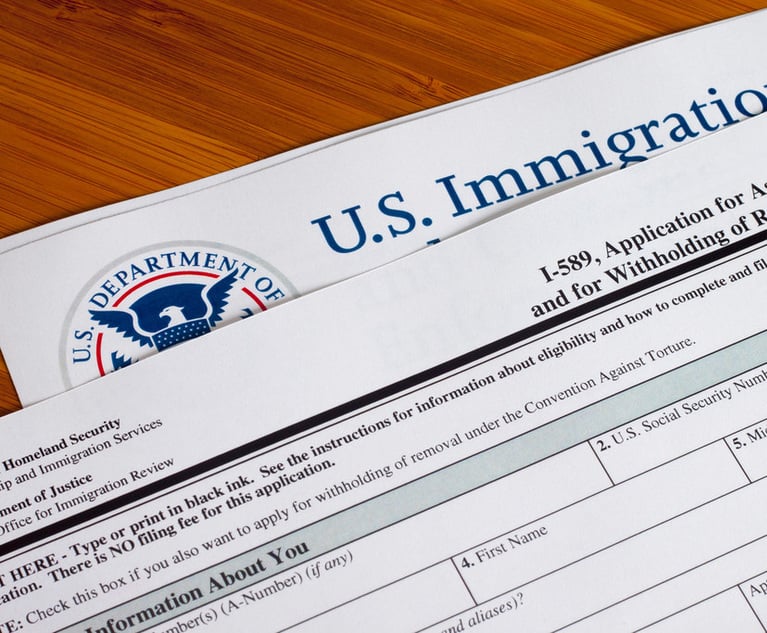Lawmakers on Both Sides Agree: Marijuana Legalization Likely in Connecticut in 2019
Connecticut legislators are readying for another round of hearings to weigh the possibility of approving recreational marijuana in 2019. Neighboring Massachusetts began legal recreational use on Tuesday.
November 20, 2018 at 01:39 PM
4 minute read
 Marijuana joint paper. (Photo: Shutterstock.com)
Marijuana joint paper. (Photo: Shutterstock.com)
As recreational marijuana became legal in neighboring Massachusetts Tuesday, Connecticut lawmakers on both sides of the legalization debate believe Connecticut will most likely decriminalize marijuana use in its next legislative session.
Both Republican House member Vincent Candelora, who is a strong opponent of legalized marijuana, and Democratic House member Steven Stafstrom Jr., a supporter, believe the votes in the state Legislature will likely swing toward legalization in 2019. The next legislative session runs from Jan. 9 through early June.
Stafstrom, who like Candelora is a member of the Judiciary Committee, said the support of legalization from Democratic Gov.-Elect Ned Lamont could break the gridlock on the topic. Outgoing Democratic Gov. Dannel Malloy was opposed to legalization of recreational use.
“I think Lamont can make a big difference,” Stafstrom said. “Certainly in a legislative structure we have a finite amount of time to get bills passed. The Legislature generally wants to focus on those substantive bills that have the best chance of becoming law, Ned Lamont has indicated a willingness to sign a bill (OK'ing legalization). That makes it an easier road to get the bill from start to finish.”
Candelora agreed that passage is probable.
“I would think it would pass,” Candelora told the Connecticut Law Tribune Tuesday. “Many of those opposed to legalization have left the Legislature. I would hope, though, that people would get a better understanding of what the drug is before voting. It's not the marijuana from the 1970s or 1980s. It's a different and more powerful drug.”
Candelora, one of the most outspoken foes of legalization, said he fears what has happened in Colorado, where there is legalization, could happen in Connecticut if it votes to approve.
“People visiting Colorado say they smell pot everywhere,” Candelora said. “It's been ingrained in their society. In Colorado, we have seen an increase in fatalities, in hospital room visits and an increase in homelessness. There are a lot of negatives. Marijuana is mind-altering and addicting.”
Candelora believes, if Connecticut were not mired in debt, legalization would have a harder time in the Nutmeg State.
“The sad reality is revenue is driving this debate,” Candelora said. “If Connecticut did not have this budget crisis, I'm not sure we'd be having this conversation.”
Government estimates indicate recreational marijuana could generate upward of $30 million in tax revenue for Connecticut in the first year, according to the Connecticut General Assembly's nonpartisan Office of Fiscal Analysis.
Countering Candelora, Stafstrom said that, by legalizing and regulating marijuana, the state could reduce negative societal impact.
“You can set the minimum age to purchase, which I suspect will be 21,” said Stafstrom, also an associate attorney with Pullman & Comley in Bridgeport. “You are regulating the age, and you can regulate the potency. You can regulate the hours of sale, and you can regulate the method of ingestion.” Stafstrom said he'd be in favor, if Connecticut OKs recreational use, of some of the revenue being set aside for treatment and prevention programs.
In a statement Monday, the pro-marijuana lobbying group Washington, D.C.-based Marijuana Policy Project, put out a statement on legalization in Massachusetts and urged Connecticut to do the same thing.
“Until cannabis is legalized and regulated, illicit dealers will continue to dominate the market, and Connecticut will miss out on the job creation, tax revenue and other economic benefits that will soon be experienced in neighboring Massachusetts,” said Matt Simon, New England political director for the group.
Related Stories:
Prohibition and the Future of Marijuana in Connecticut
Connecticut Firms Not Weeding Out Marijuana Practices, Despite Legislative Setback
This content has been archived. It is available through our partners, LexisNexis® and Bloomberg Law.
To view this content, please continue to their sites.
Not a Lexis Subscriber?
Subscribe Now
Not a Bloomberg Law Subscriber?
Subscribe Now
NOT FOR REPRINT
© 2025 ALM Global, LLC, All Rights Reserved. Request academic re-use from www.copyright.com. All other uses, submit a request to [email protected]. For more information visit Asset & Logo Licensing.
You Might Like
View All
Settlement Allows Spouses of U.S. Citizens to Reopen Removal Proceedings
4 minute read
Judge Awards Over $350K in Attorney Fees in Data Breach Class Action Settlement
3 minute read
Silk Road Founder Ross Ulbricht Has New York Sentence Pardoned by Trump
3 minute read
Preparing for Change? These Leaders Have Already Done It. Plus, Managing Partner Survey Results
8 minute readTrending Stories
- 1California Court Denies Apple's Motion to Strike Allegations in Gender Bias Class Action
- 2US DOJ Threatens to Prosecute Local Officials Who Don't Aid Immigration Enforcement
- 3Kirkland Is Entering a New Market. Will Its Rates Get a Warm Welcome?
- 4African Law Firm Investigated Over ‘AI-Generated’ Case References
- 5Gen AI and Associate Legal Writing: Davis Wright Tremaine's New Training Model
Who Got The Work
J. Brugh Lower of Gibbons has entered an appearance for industrial equipment supplier Devco Corporation in a pending trademark infringement lawsuit. The suit, accusing the defendant of selling knock-off Graco products, was filed Dec. 18 in New Jersey District Court by Rivkin Radler on behalf of Graco Inc. and Graco Minnesota. The case, assigned to U.S. District Judge Zahid N. Quraishi, is 3:24-cv-11294, Graco Inc. et al v. Devco Corporation.
Who Got The Work
Rebecca Maller-Stein and Kent A. Yalowitz of Arnold & Porter Kaye Scholer have entered their appearances for Hanaco Venture Capital and its executives, Lior Prosor and David Frankel, in a pending securities lawsuit. The action, filed on Dec. 24 in New York Southern District Court by Zell, Aron & Co. on behalf of Goldeneye Advisors, accuses the defendants of negligently and fraudulently managing the plaintiff's $1 million investment. The case, assigned to U.S. District Judge Vernon S. Broderick, is 1:24-cv-09918, Goldeneye Advisors, LLC v. Hanaco Venture Capital, Ltd. et al.
Who Got The Work
Attorneys from A&O Shearman has stepped in as defense counsel for Toronto-Dominion Bank and other defendants in a pending securities class action. The suit, filed Dec. 11 in New York Southern District Court by Bleichmar Fonti & Auld, accuses the defendants of concealing the bank's 'pervasive' deficiencies in regards to its compliance with the Bank Secrecy Act and the quality of its anti-money laundering controls. The case, assigned to U.S. District Judge Arun Subramanian, is 1:24-cv-09445, Gonzalez v. The Toronto-Dominion Bank et al.
Who Got The Work
Crown Castle International, a Pennsylvania company providing shared communications infrastructure, has turned to Luke D. Wolf of Gordon Rees Scully Mansukhani to fend off a pending breach-of-contract lawsuit. The court action, filed Nov. 25 in Michigan Eastern District Court by Hooper Hathaway PC on behalf of The Town Residences LLC, accuses Crown Castle of failing to transfer approximately $30,000 in utility payments from T-Mobile in breach of a roof-top lease and assignment agreement. The case, assigned to U.S. District Judge Susan K. Declercq, is 2:24-cv-13131, The Town Residences LLC v. T-Mobile US, Inc. et al.
Who Got The Work
Wilfred P. Coronato and Daniel M. Schwartz of McCarter & English have stepped in as defense counsel to Electrolux Home Products Inc. in a pending product liability lawsuit. The court action, filed Nov. 26 in New York Eastern District Court by Poulos Lopiccolo PC and Nagel Rice LLP on behalf of David Stern, alleges that the defendant's refrigerators’ drawers and shelving repeatedly break and fall apart within months after purchase. The case, assigned to U.S. District Judge Joan M. Azrack, is 2:24-cv-08204, Stern v. Electrolux Home Products, Inc.
Featured Firms
Law Offices of Gary Martin Hays & Associates, P.C.
(470) 294-1674
Law Offices of Mark E. Salomone
(857) 444-6468
Smith & Hassler
(713) 739-1250










